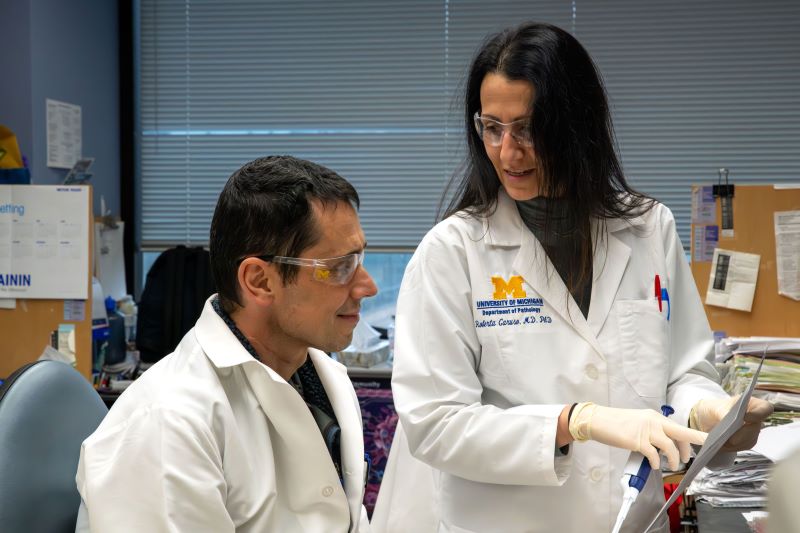By Lynn McCain
Sun-kissed Mediterranean beaches, the beauty and history of Rome, the temperate climate, and the embrace of family were compelling reasons for Dr. Roberta Caruso, Research Assistant Professor in Pathology, to stay where she was in Italy! What reasons could possibly drive her to relocate more than 4,600 miles to Ann Arbor, Michigan?
Caruso attended the University of Rome Tor Vergata for both her MD and PhD studies. Her medical training focused on gastroenterology and her research was looking at the cross talk between immune and non-immune cells driving inflammation. “I was treating a patient with Inflammatory Bowel Disease (IBD) in the clinic, then going to my research lab to try to better understand the mechanisms driving this disease,” she explained. “I was trying to find a better way to treat these patients. Our current knowledge of the pathogenesis of this disease is still limited.” At the same time, there was an Italian postdoc at the University of Michigan, who used to collaborate with her in Rome. “He was telling me about the University of Michigan and what a vibrant college town it is and what a great research environment could be found there.”
Caruso knew of Dr. Gabriel Nuñez, one of the world’s foremost experts in Crohn’s Disease Research who conducted his research as part of the Department of Pathology at the University of Michigan. Her colleague’s descriptions of the University of Michigan and Ann Arbor intrigued her. She wanted to expand her research career, so she reached out to Nuñez to see if there may be a position for her in his laboratory. To her delight, he invited her to join him at Michigan. “It was only going to be for three years, but I have been here for 10 years now, and I really enjoy it!” Caruso does miss the warmth and beauty of Rome and her family, but also finds Ann Arbor to be a great place to live. “I found such great collaborators at Michigan. There are some really nice people here and they actually want to help you. When you are young, with a young research team, you struggle to establish your research program. Now you have found some people that really want to help you, and that's amazing, because they don't want anything. They are happy to help you.” Caruso recalls getting an email from an established researcher from whom she had asked for advice. “They would come on Saturday to help me. I was shocked when they said, ‘Oh, let's meet Saturday in my lab in 2 weeks.’ That was really amazing. I did not find anything like that when I was in Italy. So that was pretty surprising to me and I'm really grateful to these collaborators.”

In the early days at Michigan, Caruso struggled to establish her research. Then she was able to develop a mouse model of Crohn’s disease that immunologically and pathologically resembles the human disease without requiring any type of intervention. Her model was published in Science Immunology. Her research had reached a turning point. She was able to use this mouse model to effectively and efficiently test her hypotheses regarding the mechanisms of Crohn’s disease. Recently, she performed a series of experiments and obtained unexpected results. Mice who were fed a fiber-free diet were not developing Crohn’s disease -like colitis and those with inflammation were recovering. Through a series of experiments, she uncovered the mechanism through which dietary fiber leads to altered localization of the disease-causing bacterium, Mucispirillum schaedleri, a mucus-dwelling anaerobe found both in mice and humans. The absence of dietary fiber reduced the availability of nutrients and impaired the dissimilatory nitrate reduction to ammonia (DNRA) metabolic pathway of M. schaedleri, leading to its exclusion from the mucus layer and disease remission. Her research was recently published in Cell Host & Microbe. While the bacterium did not clear from the lumen, it was effectively cleared from the mucus layer, allowing the lining of the bowel to heal. Further research is ongoing to possibly move this finding toward a therapeutic option for patients.
As a mother to a 2-year-old, the greatest challenge Caruso faces as a researcher is work-life balance. The demands of caring for her newborn son through the COVID pandemic and trying to continue her research was taxing for her. The supportive environment at Michigan has helped her with this transition and as the world moves past the COVID crisis and her son gets a bit older, some of the strain has eased. In spite of these challenges, he is also the source of her greatest pride and joy.
Caruso also finds joy in research. Sometimes she feels like research is a series of highs and lows, much like the old Howard Cosell quote, “The thrill of victory and the agony of defeat.” The fantastic grant application is submitted with high hopes. But it wasn’t funded; then the next day, your experiment may bring a breakthrough. One day you are feeling down and discouraged and the next you are flying high on the thrill of discovery. There is always the next big discovery that keeps Caruso motivated as she diligently works to find answers for patients suffering with colitis. We, too, are looking forward to the results sure to come from her research efforts!
Citations:
Roberta Caruso, Tailor Mathes, Eric C. Martens, Nobuhiko Kamada, Asma Nusrat, Naohiro Inohara, Gabriel Núñez. A specific gene-microbe interaction drives the development of Crohn's disease-like colitis in mice. Sci Immunol. 2019 Apr 19;4(34):eaaw4341. doi: 10.1126/sciimmunol.aaw4341. PMID: 31004013PMCID: PMC8882361
Kuffa et al., Fiber-deficient diet inhibits colitis through the regulation of the niche and metabolism of a gut pathobiont,Cell Host & Microbe (2023), https://doi.org/10.1016/j.chom.2023.10.016